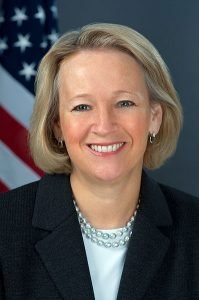
On Tuesday September 11, Vanguard Founder Jack Bogle and Boston University scholar Tamar Frankel, representing the signatories of the Fiduciary Declaration, met with SEC Chairman Mary Schapiro. In the meeting Chairman Schapiro was presented with the Fiduciary Declaration and Bogle and Frankel addressed their concerns.
The twelve signatories of the Fiduciary Declaration, along with Bogle and Frankel, are: Sheila C. Bair, Alan A. Blinder, Peter G. Fitzgerald, Andrew K. Golden, Roger G. Ibbotson, Arthur Levitt, Daniel Kahneman, Burton G. Malkiel, David F. Swensen and Paul A. Volcker.
I introduced the Declaration and group of signatories to Chairman Schapiro. Their contributions to their professions and country though scholarship, business enterprise, and public service testifies to their enormous capacity to serve. While their collective imprint is impossible to quantity, one might recall the words of John Kennedy and surmise (with a tweak) that this might be the most accomplished and most respected group of financial services leaders since Alexander Hamilton dined alone.
Transcending their subject matter expertise, the signatories, I believe, share basic underlying concerns that unite them around the call for the fiduciary standard.
Alan Blinder, for example, notes, “I have long been concerned – but more as a citizen than as an economist – that too few “sell side” representatives had much sense of fiduciary duty. Recent events have heightened that concern….” Andy Golden explains he signed the Fiduciary Declaration, because the fiduciary standard is “about society, protecting my mother, my friends and my kids.”
While I did not try to highlight their individual accomplishments, I mentioned two recent events, one honoring Tamar Frankel, the other honoring Jack Bogle.
On October 29, 2010, more than 25 scholars from around the world convened at Boston University and presented at the symposium, “The Role of Fiduciary Law and Trust in the twenty-first Century; A Conference Inspired by the Work of Tamar Frankel.”
This past January, a Forum co-chaired by Paul Volcker and Arthur Levitt, and co-sponsored by the Institute for the Fiduciary Standard, posed the question, “Restoring Trust in Financial Markets: Does Jack Bogle Offer A Prescription?”
Jack Bogle spoke to the Chairman about the need to apply the universal fiduciary standard to institutions (such as the mutual fund managers) and not only retail customers. He explained this industry used to be thought of as a profession with commerce and now it is thought of as a business. Bogle is very concerned about conflicts between an institutional managers’ fiduciary duty to her clients and her duty to corporate management. Further, he spoke urgently about the need for independence in corporate boards and strong corporate governance
Tamar Frankel expressed concern about the millions of pre-retirees and how they lack the protection of the fiduciary standard. Frankel proposed that the least SEC can do is to enforce a four to five point written notice which includes the status of the advisor, how he or she is paid, who pays him or her and how much is the pay.
At this point I spoke directly to the Chairman:
Madam Chairman, you have served your country during extraordinary times. Throughout, you have kept fiduciary duty “on the table.” Your support is unequivocal. Your keen understanding of why fiduciary status matters is clear. You have explained a fiduciary “must avoid conflicts of interest that impair its capacity to act for the benefit of its customers or clients. And if such conflicts cannot be avoided, a fiduciary must provide full and fair disclosure of the conflicts and obtain informed consent to the conflicts.” Strong language, indeed. But you have gone further by also saying a weakened fiduciary standard is not good enough: “The standard …. should not be a watered-down fair and reasonable commercial standard.”
In closing we suggested to the Chairman that as she continues to speak out for the millions of investors, she is not alone. She is joined by many in the industry who, though less well-funded and less vocal than others, stand firmly by her call for the fiduciary standard that inspires the trust and confidence of investors.
This was a unique meeting, a meeting I believe no one attending will soon forget.

